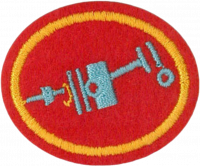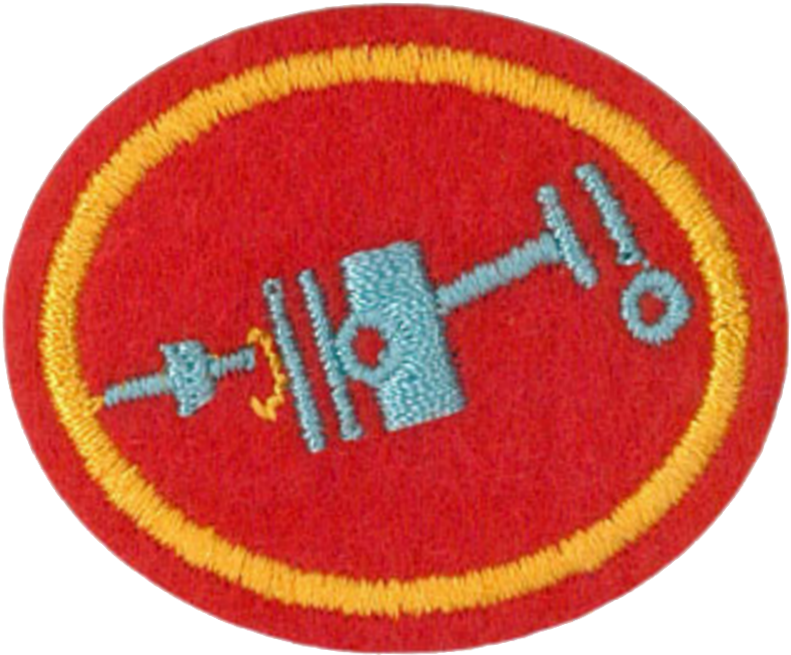Difference between revisions of "AY Honors/Small Engines/Answer Key/es"
From Pathfinder Wiki
< AY Honors | Small EnginesAY Honors/Small Engines/Answer Key/es
(Created page with "{{clear}}") |
(Updating to match new version of source page) |
||
| (3 intermediate revisions by one other user not shown) | |||
| Line 8: | Line 8: | ||
{{clear}} | {{clear}} | ||
| − | |||
{{clear}} | {{clear}} | ||
| − | |||
| − | |||
{{clear}} | {{clear}} | ||
| − | |||
| − | |||
{{clear}} | {{clear}} | ||
| − | |||
<noinclude></noinclude> | <noinclude></noinclude> | ||
| Line 38: | Line 32: | ||
<!-- 4. Demostrar el cuidado y la seguridad en el manejo del combustible y su almacenamiento. --> | <!-- 4. Demostrar el cuidado y la seguridad en el manejo del combustible y su almacenamiento. --> | ||
| − | |||
{{clear}} | {{clear}} | ||
| − | |||
<noinclude></noinclude> | <noinclude></noinclude> | ||
{{CloseReq}} <!-- 4 --> | {{CloseReq}} <!-- 4 --> | ||
{{ansreq|page={{#titleparts:{{PAGENAME}}|2|1}}|num=5}} | {{ansreq|page={{#titleparts:{{PAGENAME}}|2|1}}|num=5}} | ||
| − | <noinclude> | + | <noinclude></noinclude> |
| − | </noinclude> | + | <!-- 5. Describir tres clases de sistemas de encendido. --> |
| − | <!-- 5. | ||
| − | |||
| − | |||
| − | |||
| − | |||
{{clear}} | {{clear}} | ||
| − | |||
{{clear}} | {{clear}} | ||
| − | |||
<noinclude></noinclude> | <noinclude></noinclude> | ||
{{CloseReq}} <!-- 5 --> | {{CloseReq}} <!-- 5 --> | ||
{{ansreq|page={{#titleparts:{{PAGENAME}}|2|1}}|num=6}} | {{ansreq|page={{#titleparts:{{PAGENAME}}|2|1}}|num=6}} | ||
| − | <noinclude> | + | <noinclude></noinclude> |
| − | </noinclude> | + | <!-- 6. Explicar por qué la gasolina es un líquido de limpieza inadecuado. --> |
| − | <!-- 6. | ||
| − | |||
| − | |||
<noinclude></noinclude> | <noinclude></noinclude> | ||
{{CloseReq}} <!-- 6 --> | {{CloseReq}} <!-- 6 --> | ||
{{ansreq|page={{#titleparts:{{PAGENAME}}|2|1}}|num=7}} | {{ansreq|page={{#titleparts:{{PAGENAME}}|2|1}}|num=7}} | ||
| − | <noinclude> | + | <noinclude></noinclude> |
| − | </noinclude> | + | <!-- 7. Hacer una lista de dos líquidos de limpieza aceptables para los motores pequeños. --> |
| − | <!-- 7. | ||
| − | |||
| − | |||
{{clear}} | {{clear}} | ||
| Line 82: | Line 61: | ||
{{CloseReq}} <!-- 7 --> | {{CloseReq}} <!-- 7 --> | ||
{{ansreq|page={{#titleparts:{{PAGENAME}}|2|1}}|num=8}} | {{ansreq|page={{#titleparts:{{PAGENAME}}|2|1}}|num=8}} | ||
| − | <noinclude> | + | <noinclude></noinclude> |
| − | </noinclude> | + | <!-- 8. Hacer una lista de tres sistemas de lubricación y decir cómo funcionan. --> |
| − | <!-- 8. | ||
| − | |||
| − | |||
{{clear}} | {{clear}} | ||
| Line 99: | Line 75: | ||
{{CloseReq}} <!-- 8 --> | {{CloseReq}} <!-- 8 --> | ||
{{ansreq|page={{#titleparts:{{PAGENAME}}|2|1}}|num=9}} | {{ansreq|page={{#titleparts:{{PAGENAME}}|2|1}}|num=9}} | ||
| − | <noinclude> | + | <noinclude></noinclude> |
| − | </noinclude> | + | <!-- 9. Hacer una lista en orden de los pasos generales del procedimiento de buscar la solución de problemas a los motores. --> |
| − | <!-- 9. | ||
| − | |||
| − | |||
{{clear}} | {{clear}} | ||
| Line 116: | Line 89: | ||
{{CloseReq}} <!-- 9 --> | {{CloseReq}} <!-- 9 --> | ||
{{ansreq|page={{#titleparts:{{PAGENAME}}|2|1}}|num=10}} | {{ansreq|page={{#titleparts:{{PAGENAME}}|2|1}}|num=10}} | ||
| − | <noinclude> | + | <noinclude></noinclude> |
| − | </noinclude> | + | <!-- 10. Demostrar que usted puede revisar, inspeccionar y ajustar adecuadamente cualquier motor pequeño. --> |
| − | <!-- 10. | ||
| − | |||
| − | |||
| − | |||
<noinclude></noinclude> | <noinclude></noinclude> | ||
{{CloseReq}} <!-- 10 --> | {{CloseReq}} <!-- 10 --> | ||
{{ansreq|page={{#titleparts:{{PAGENAME}}|2|1}}|num=11}} | {{ansreq|page={{#titleparts:{{PAGENAME}}|2|1}}|num=11}} | ||
| − | <noinclude> | + | <noinclude></noinclude> |
| − | </noinclude> | + | <!-- 11. Demostrar que usted sabe cómo poner a prueba y limpiar las bujías y los tapones de calentamiento/bujía incandescente. --> |
| − | <!-- 11. | ||
| − | |||
| − | |||
<noinclude></noinclude> | <noinclude></noinclude> | ||
| Line 136: | Line 102: | ||
<noinclude></noinclude> | <noinclude></noinclude> | ||
==Referencias== | ==Referencias== | ||
| − | |||
<noinclude></noinclude> | <noinclude></noinclude> | ||
{{CloseHonorPage}} | {{CloseHonorPage}} | ||
Latest revision as of 23:03, 18 July 2022
Motores pequeños
Nivel de destreza
2
Año
1975
Version
20.02.2026
Autoridad de aprobación
Asociación General
1
Describir el diseño y el funcionamiento de los motores de dos tiempos y el motor de cuatro tiempos.
2
Nombrar las partes de los motores de dos tiempos y decir lo que hace cada parte.
3
Hacer una lista de cuatro combustibles utilizados en motores pequeños y explicar su uso.
4
Demostrar el cuidado y la seguridad en el manejo del combustible y su almacenamiento.
5
Describir tres clases de sistemas de encendido.
6
Explicar por qué la gasolina es un líquido de limpieza inadecuado.
7
Hacer una lista de dos líquidos de limpieza aceptables para los motores pequeños.
8
Hacer una lista de tres sistemas de lubricación y decir cómo funcionan.
9
Hacer una lista en orden de los pasos generales del procedimiento de buscar la solución de problemas a los motores.
10
Demostrar que usted puede revisar, inspeccionar y ajustar adecuadamente cualquier motor pequeño.
11
Demostrar que usted sabe cómo poner a prueba y limpiar las bujías y los tapones de calentamiento/bujía incandescente.


